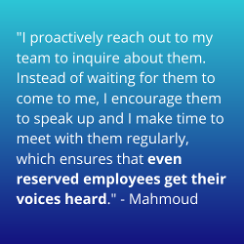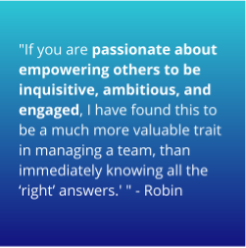In this blog, meet two managers that lead their teams with success – but that didn’t come immediately, it took hard work and many learning experiences over the years! Hear how Mahmoud and Robin listened to their own advice and figured it out. Get tips on supporting your employee's development and ensuring all voices on your team are heard.
A few months ago, Nuance manager, Kristian, shared his secrets to being a great manager. Let’s hear from a few more managers! Mahmoud is a Senior Manager in our Montreal office on the Enterprise Professional Services team. Robin is a Senior Manager of Sales Support on the GDOT (Global Deal Optimization Team), Healthcare. Hear firsthand how they tackle everyday challenges and ensure their employees feel informed, supported, and positive about their work. Plus, get practical management tips and ideas, whether you’re managing a team or a project.
Think Big is one of our Nuance Values, which is very fitting for a technology company! How do you enable your employees to innovate and be creative in their roles?
Mahmoud: Sky’s the limit! Whether we’re talking about our process or tools, I ask my team what they feel can be improved and how we could have taken a different approach to a problem. To avoid them setting limits on what they could achieve, I encourage them to think long term to get their brain juices flowing and prevent them from getting bogged down with what’s achievable in the short term. To avoid my team members feeling that their shared thoughts and recommendations have fallen on deaf ears, I inform them of progress, so they know it’s being actioned. If their idea is just a seed, we talk about it frequently and I provide them with the tools, time, resources, and support to grow that seed into a plant. Finally, I give credit where credit is due! I make sure they get the exposure they deserve for having taken the time to focus on improving the way we do business, which ultimately, allows us to better serve our customers.
How do you build psychological safety in your team?
Robin: My team has grown from five to eleven team members in the last two years. As part of the interview process, I asked candidates to share an experience in which they “Failed Fast and Forward,” so I could see how comfortable they were admitting to mistakes and if they learned from them.
I routinely reinforce that we are all human, and making mistakes is part of the learning process. I make sure my team members see that I also make mistakes and am not shy in admitting it and owning them. De-emphasizing the mistake, and alternatively, highlighting how an employee effectively managed the outcome and applied that knowledge is something we frequently share in team meetings.
Mahmoud: On my team, it’s all about the people, their ideas, and voices! In addition to our company’s annual survey where all employees speak their minds, I hold weekly team meetings to offer the opportunity to speak about topics that are important to them. I also have an open-door policy where anyone can reach out to me at any time, and I’ll always prioritize them first. Giving my team this uninterrupted time to speak up and showing appreciation for their feedback helps to maintain a safe zone. There are no bad opinions, and for me, it’s extremely important that everyone gets a chance to voice their thoughts. I try my best to get rid of negativity and focus on team building so everyone can participate in decision-making. COVID-19 has tested our patience and increased stress levels, so it has become even more important to provide employees with the capacity to express themselves. It’s of the utmost importance to me that my team knows I genuinely care about their well-being.
How do you ensure all voices on your team are heard and that you embrace different perspectives?
Robin: Giving team members ample and varying opportunities to provide feedback and input is very important. Some are more forthcoming in a one-on-one setting, whereas others are more communicative in a small group setting. I have some who prefer to collect their thoughts “on paper” and then review them together. Giving employees multiple options, environments, and mediums to express their perspectives helps them feel empowered to share their thoughts.

Mahmoud: I proactively reach out to my team to inquire about them. Instead of waiting for them to come to me, I encourage them to speak up and I make time to meet with them regularly, which ensures that even reserved employees get their voices heard. Allowing my team members to speak their mind and fully express their ideas without interruption ensures that they know I am open to hearing different perspectives and truly welcome their feedback. When team members bring forward recommendations, I facilitate meetings and coordinate presentations to not only make sure they are heard, but to also give them the exposure they deserve and allow us as a team to improve based on these recommendations. I always make myself available to support them.
Talk about the importance of employee development and how you support it? Share specific examples.
Robin: In addition to “Fail Fast and Forward,” I also like to ask candidates how they find time and take initiative to “Stay Curious” at work, a Nuance value fundamental to fostering employee development. I highly encourage my team to leverage internal Nuance resources like Mentoring Matters, to help them step out of their comfort zone and develop a strategy around achieving their professional goals. In their one-on-one meetings, I ask my employees to share what they discussed recently with their mentors and offer my ideas on how they can practice what they learned, like having them take lead on a project that perhaps normally they wouldn’t raise their hand to do.
In the spirit of “Stay Curious,” I recently asked each team member to find an article, podcast, or any media artifact relevant to Nuance and/or their role and share what they learned with the team in a slide. It provided a great forum to foster each employee’s curiosity and the bonus was that the broader team benefitted from the knowledge as well! I also routinely solicit feedback about recent experiences from Nuance colleagues throughout the year. When it’s positive, it’s a great opportunity to send out a positive “kudos” message and thank them for their hard work and it quantifies their impact on a team and/or client. If it’s constructive, it offers direct insight and perspectives on areas of potential growth.
Mahmoud: Employee development is important, and it doesn’t have to fit into a pre-established track. I’ve had developers on my team express interest in Project Management. I held conversations with our People Team to find them the right project to start on and assigned them a mentor to support and shadow them as they transition into a new role. Lateral moves and hands-on learning experiences are great options for career progression, rather than the traditional ‘one size fits all’ approach.
In addition, I’ve given employees who have been on long standing customer accounts a chance to transition to different accounts by exposing them to new technologies and verticals, and as a result, they’ve developed new skills. Nuance also offers a ton of training, so I remind my team and make sure they have time to take advantage by reducing their allocation to customer projects. Finally, as part of our goal process, my team sets their own personal objectives that we revisit frequently, track, and adjust as their needs evolve.
Change is part of our everyday – how do you lead and support people through change?
Mahmoud: Communication is key! As technologies, customers, and the landscape evolve, taking time to listen to my employees is essential. Through our mentorship program, I make sure that my team is trained, feel supported, and are prepared to deliver newly released technologies and products to our customers. I also invest in my employees and enable those who request external training applicable to their roles to keep them current, as technology in our space continues to evolve.
What advice do you have for new managers or those who aspire to be a manager?

Robin: Early on as a new manager, I felt compelled to know all the answers to my team’s questions and if I didn’t, I thought I I wasn’t a good manager or leader. I felt that saying ‘I’ll have to get back to you on that” was a sign of failing as leader – and with several different roles on my team (most of which I’d never be in myself!), it was physically impossible for me to know all the answers to every question. I have learned that I don’t have to have the answer key to all questions to be a trusted and strong leader; it’s about creating a positive environment where employees feel empowered to ask the questions directly from the experts, knowing that you have their back should they need you for guidance, as a sounding board, or an escalation resource. If you are passionate about empowering others to be inquisitive, ambitious, and engaged, I have found this to be a much more valuable trait in managing a team, than immediately knowing all the “right” answers.
Mahmoud: Take care of your employees, and the rest will take care of itself! To get the best performance from your team, make sure they are happy in their work environment, support their career ambitions, always make yourself available to them, and last but not least, ensure a good work-life balance. Whether you’re a new or a seasoned manager, there’s always room for improvement – just be sure you are open to feedback from your team members.
Be a “servant leader” first and trust that your team is made up of experts. They know what they’re doing, and we, as managers, need to enable them and help to remove their roadblocks so they can do their job properly. Don’t assume that if an employee hasn’t reached out, then things are fine. Be proactive, reach out first, make sure they feel safe in sharing their thoughts, and always keep communication lines open.






